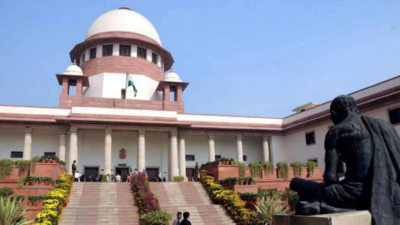

NEW DELHI: The Supreme Court on Friday inquired from the Centre whether the court-crafted elaborate framework for prevention of hate crimes be replicated to protect Christian institutions as a PIL claimed a spurt in attacks on them in the last few years across India.
The PIL by archbishop of Bangalore Diocese Peter Machado, along with the National Solidarity Forum and the Evangelical Fellowship of India, has claimed that attacks against Christians and their institutions are on the rise in India and sought direction to the Centre and state to take adequate preventive and protective measures.
Senior advocate Colin Gonsalvesappearing for the archbishop and the companion organization, told a bench of Justices D Y Chandrachud and J B Pardiwala that in the year 2021, as many as 505 attacks took place against Christians and Christian institutions and sought appointment of Nodal officers in each district to take preventive measures as well as monitor crimes against Christian institutions.
When the bench was issuing notice to the Centre and states, central government counsel Kanu Agrawal interjected and requested the court not to issue notice without hearing solicitor general Tushar Mehta.
A little later, Mehta joined the proceedings virtually and told the bench that the Union government would file a preliminary reply to the PIL. The bench said “We concerned with only a limited issue – whether the framework laid down against hate crime by the SC in 2018 in the Tehseen Poonawala case could be applied to this case?”
“We also want to know whether that framework is being followed by the states and the Union government. That is a key framework,” the bench said. It posted the matter for further hearing on August 16.
In the Poonawala case on July 17, 2018, the SC had laid down the framework containing a 12-point preventive guideline, 9-point remedial guideline and 2-point punitive guidelines.
Under the preventive guidelines, the SC had mandated appointment of a SP-rank police officer as nodal officer in each district to monitor and direct preventive measures against hate crimes and mob lynching, identifying communal hot spots by gathering intelligence and stopping dissemination of communally explosive messages.
Under the remedial measures, the SC had mandated compensation to kin of victims, fast track trial of accused in mob lynching cases, and asked the trial courts to impose maximum punishment provided in IPC for such crimes. Under punitive measures, it had directed the states and Centre to initiate both departmental and criminal proceedings against police officers whose derelection of duty led to mob lynching or hate crimes.
FacebookTwitterInstagramKOO APPYOUTUBE






